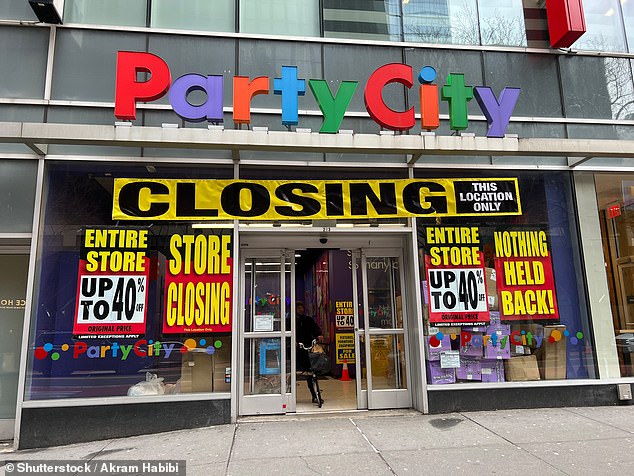Big Lots and Party City were both saved from closure.
The two retailers have no connection other than they were both in the news this month after saying they were going out of business within two days of each other.
But they could now also become sister companies if retail magnate Mitch Modell has his way.
The founder of the sporting goods chain Modell has bold plans to save the two struggling brands.
Last Friday (December 20), Party City bosses shocked staff by telling them the company was going into administration and would close all its remaining 700 stores in February. The next day the company filed for bankruptcy.
It was the second announcement in as many days that a well-known retailer was closing its doors.
Big Lots announced on Dec. 19 that it was beginning sales at all of its 963 remaining U.S. locations after a buyer fell through. It had filed for bankruptcy in September and hoped to continue operating after restructuring.
In an exclusive interview with The Real Deal, Modell revealed that he plans to make a formal bid for both companies by the end of the week.
Party City will immediately close all of its stores, ending nearly forty years of existence
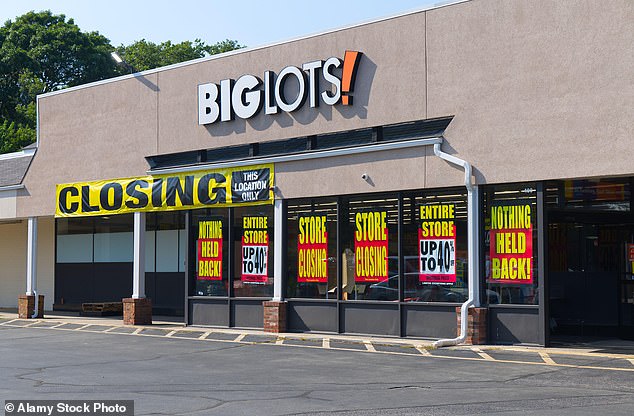
Big Lots begins out-of-business sales at all its U.S. stores as it prepares to close remaining locations

Mitch Modell – the founder of the Modell sporting goods chain – has bold plans to save Big Lots and Party City
Although Modell has not yet contacted either company or legal counsel, he made it clear that he is committed to reviving both brands.
“We’re going to get the deal done,” Modell stated confidently in the interview.
To lead the charge, Modell has assembled a seasoned team, including Demos Parneros, former CEO of Barnes & Noble, and Larry Meyer, former CFO of Forever 21.
Modell plans to appoint Parneros as CEO and Meyer as CFO of the new company. Meyer would also take on the role of executive vice president.
Modell, who closed his own 141-store sporting goods chain earlier in 2020, said he expects the financing to be in place by the end of the week but declined to provide details on his funding sources.
Both Party City and Big Lots have been in financial turmoil for months. Party City, which employs about 12,000 people, recently informed its employees that it plans to close its doors in February.
With about 700 stores nationwide, the company is struggling with declining sales, rising debt and increased competition.
Big Lots is also in a similar position and is currently in the process of closing approximately 970 locations and liquidating remaining inventory.
Despite these bleak circumstances, Big Lots CEO Bruce Thorn has expressed hope of finding a buyer, and Modell sees an opening to step in and “save” both brands.
“We want to save every job in the 1,600 stores,” he said, referring to the combined number of Party City and Big Lots locations.
Modell’s vision for the two companies involves a dramatic shift in focus.
While Party City would retain its core business of party supplies, Modell anticipates that Big Lots will focus on affordable clothing and sporting goods.
He also plans to introduce cheap shoes (which cost as little as $20) and fresh produce.
The revamped Big Lots would also cut back on certain product categories, including furniture, recliners and electronics over $10.
Instead, Modell wants to focus on offering “closeouts” and “special deals” that come directly from curators.
“We’re going to make this a treasure hunt on steroids,” Modell explained, adding that most items would cost $10 or less. To keep costs down, Modell plans to source goods directly from factories and farms.
With 75 warehouses full of goods ready to ship, Modell is already gearing up for the next phase of its retail comeback. He aims to have a prototype store open by mid-January.
“Everyone – lenders, creditors, bankers, investors – who doubted me is going to see what a store looks like and the excitement it brings,” he said.
Party City was also in the news this week when it emerged that the final nail in the coffin was self-inflicted.
The chain’s problems started with an appraisal conducted by retail consultant Hilco Global, which Party City hired in September.
The company was tasked with assessing the value of Party City’s inventory – the products stored in its stores and warehouses – as part of a plan to secure more financing.
Bosses had hoped that a generous valuation of the value of its inventory – from suits to party hats – would allow the retailer to borrow more money to shore up its finances.
However, in mid-November, Hilco’s preliminary report delivered a crushing blow to the company. It said the value of Party City’s inventory had been reduced “dramatically” compared to previous appraisals.
“This essentially means that the appraisers believe that the various products on store shelves and stacked in warehouses were worthless,” a retail expert told DailyMail.com. Because the expert consulted with Party City, they asked not to be named.
This revelation about the decline in stock values was shared by Party City attorney Christopher Hopkins during a U.S. Bankruptcy Court hearing in Houston on Monday.
After the initial low valuation, Party City’s creditors, who were owed about $162 million, demanded the retailer put $50 million in reserve to cover loans.
This brought the company closer to the abyss, according to court documents.
The group of creditors took over the company when it first filed for bankruptcy in February 2023.
When the group was unwilling to make more investments and the company could no longer attract external funds, the company had to take more drastic action.
This included halting new inventory orders, deferring rent and vendor payments, halting new inventory orders and deferring rent and vendor payments, according to court documents.
Although Party City managed to emerge from bankruptcy last September, by December 10 of this year its cash inventory had fallen below the $50 million reserve its lenders wanted, and the company refiled for Chapter 11 bankruptcy .
Lenders “felt it essential to begin selling stores in advance of the Christmas and New Year’s sales to maximize the proceeds from such sales for the benefit of all stakeholders,” Party City Chief Restructuring Officer Deborah Rieger-Paganis said in an affidavit to the bankruptcy. court.
These are bleak times for US retailers, as non-essential spending plummets due to the rising cost of living.
America’s Best Department Store Macy’s will close 65 stores within weeks.
Retail experts warn this could be just the beginning, with 2024 set to see the highest number of store closures since the pandemic.
So far this year, US retailers have closed 7,300 stores – almost 60 percent more than in 2023.
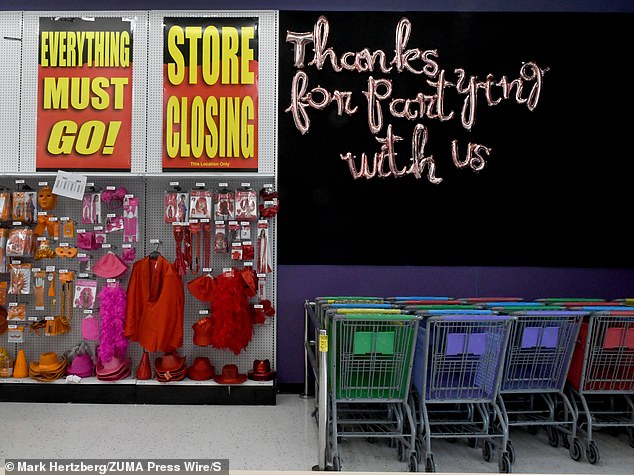
The final nail in Party City’s coffin appears to be self-inflicted
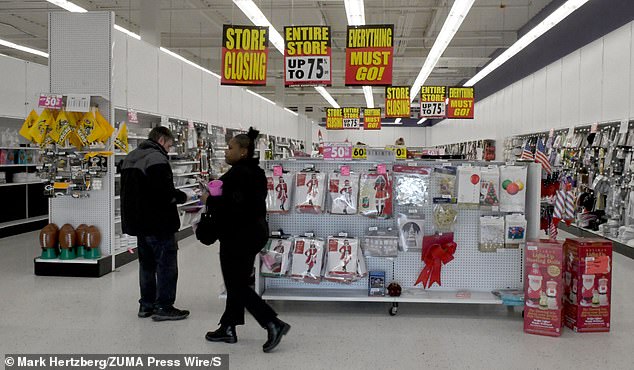
The chain’s problems started with a valuation carried out by retail consultant Hilco Global
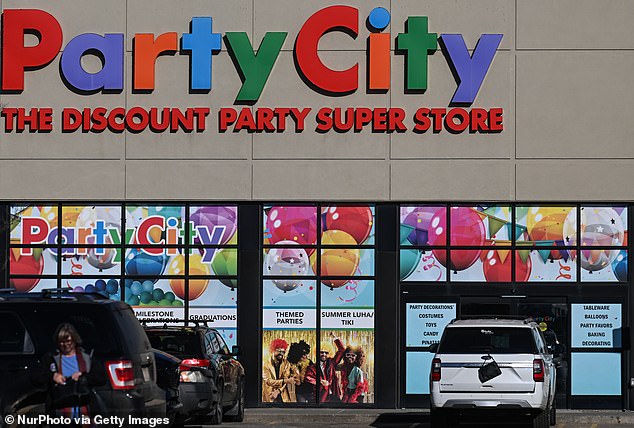
The New Jersey-based party suppliers are going bankrupt under financial pressure
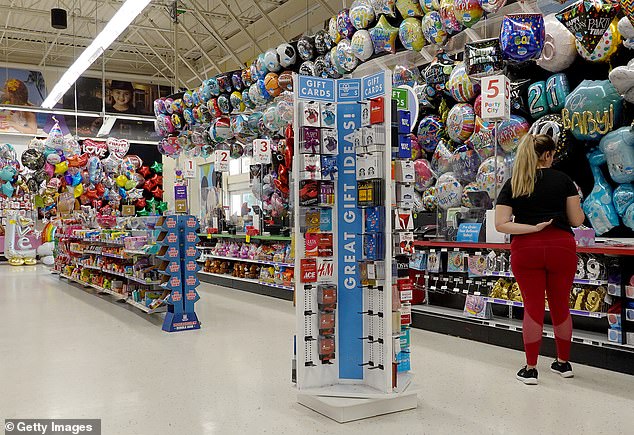
Despite being saved from bankruptcy in 2023, the retailer never recovered
Party City, the largest party supplies retailer in the U.S., employed approximately 6,400 full-time and 10,100 part-time employees in 2021.
When Litwin took over in August, he promised to strengthen Party City’s finances.
A cloud of uncertainty has hung over Party City since the company first filed for bankruptcy in January 2023. The company only left the company in September.
The company had wiped out $1 billion of its $1.7 billion debt. It also managed to keep the majority of its more than 800 stores open, although more than 80 locations were closed between late 2022 and August 2024.
Party City – based in Woodcliff Lake, New Jersey – underwent a restructuring when lenders including Monarch Alternative Capital and Silver Point Capital took over and managed to pay off about $1 billion of its debt, allowing about 850 stores to open to stay.
Although some stores were saved, more than 60 were forced to close, including five in Topeka, Kansas, Salina, New York, Joplin, Missouri, and Owensboro, Kentucky, and most recently in Staten Island.
But the remaining debt of $800 million proved too much.
Party City was successfully expanding before the pandemic and had revenue of $2.35 billion in 2019, according to Forbes.
Overnight, key customers – those hosting or attending parties – had no reason to shop in store as social distancing was introduced.
As the country emerged from lockdowns, it was plagued by supply chain problems, rampant inflation and increased competition.


